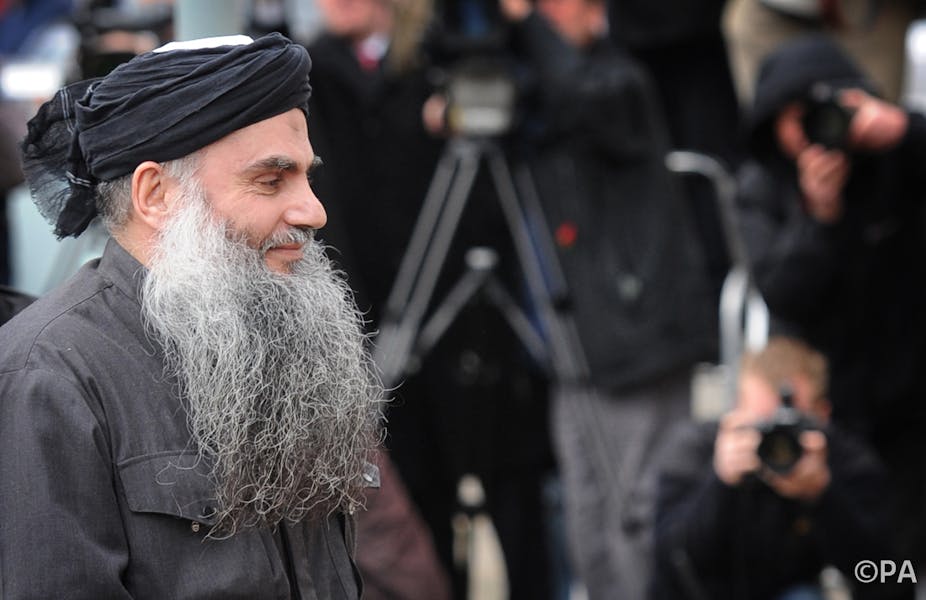Abu Qatada was deported to Jordan from the UK in the early hours of Sunday morning to face terrorism charges. For the British home secretary, Theresa May, it was a triumph in the face of a judiciary which had always maintained that Qatada would be at risk of having an unfair trial if deported to Jordan.
A smile was visible on Qatada’s face through the window of the aircraft that was taking him back to Jordan. David Cameron, who is on the record as saying that Abu Qatada made “my blood boil” says he is “delighted” at his removal and the media has greeted his deportation as a triumph which will boost May’s standing in the government.
Qatada has been described as a mouthpiece for al-Qaeda in Britain, but a central question remains unanswered: why was he never charged with a terrorism offence in the UK? Given the Terrorism Act 2006, which makes an offence of the “glorification” of terrorist acts, surely it would have been possible (and perhaps preferable) to try him here first?
Was this seeming inability to prosecute Qatada in Britain part of wider failings with the government’s counter-terrorism legislation - or could it have been something to do with MI5 and the security services’ tarnished reputation following allegations that they participated in extraordinary rendition of other terrorism suspects?
Jordan ‘poor’ on human rights
Now that the government’s “bogeyman” has gone, the focus of this story shifts to the question of whether we can be safe in the assurance we have been given that Jordan will comply with human rights legislation and give Abu Qatada a fair trial.
Jordan has a very poor record on human rights. According to Human Rights Watch, Jordan has been involved in the arrest and abuse of political activists involved in demonstrations in the past. Amnesty International has argued that Jordan has a long history of using torture and ill-treatment as a means to coerce and extract information from detainees.
Amnesty’s annual report regarding Jordan showed that at least one prisoner had been “tied and beaten” in order to teach him a “lesson” after he and 12 others were involved in peaceful demonstrations (they were subsequently released without charge).
Changes to human rights laws
Another worrying aspect to this case is the government’s suggestion that Britain might withdraw from European human rights legislation. May stated, “all options - including leaving the convention altogether - should be on the table”. The government has, in the past, made no secret of its distaste for the European Court, which blocked the removal of Qatada on numerous occasions.
The government has been investigating the possibility of introducing a new Bill of Rights which would replace Britain’s obligations under European human rights convention. Both the home secretary and the justice secretary, Chris Grayling, have indicated that there would have to be wholesale changes to British law to ensure that a similar situation cannot arise again. May has specifically promised to remove “the many layers of appeals available to foreign nationals we want to deport”.
But to withdraw from the Convention - a treaty - would require the consent of Parliament. This would be difficult to do given the state of the parties, so the only realistic way to withdraw might be to publish plans for withdrawal in the next Conservative manifesto and campaign on the issue. Such a manifesto promise might shore up support among those in the party thought most likely to defect to UKIP in 2015.
But the Human Rights Act 1998 is enshrined in UK law as a way of ensuring the principles contained in the European Convention of Human Rights are enshrined in British law, however much we may despise any individuals who are able to take advantage of those rights. As a result the UK government has to ensure that its anti-terrorism agenda does not breach the relevant articles, such as Article 5: the right to liberty, Article 6: the right to a fair trial and Article 10: the right to freedom of expression.
It will be interesting to see what happens to Qatada as he faces his trial in Jordan. I am not very optimistic that he will be afforded fair treatment - in the past, at least, human rights and Jordan haven’t tended to mix. But the government’s view that people such as Qatada are worth ditching our commitment to human rights for makes me worry even more.

